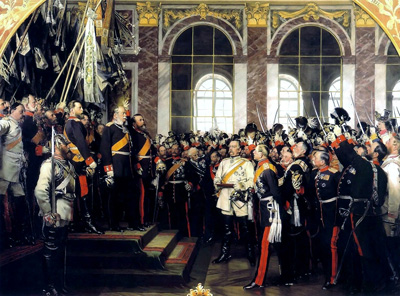Eugen Weber, France: Fin de Siècle -- Modernity and Defeat
Psychic and physical deterioration alike were blamed on modern -- especially urban-living. If society was a living
Proclamation of Prussian king Wilhelm I as German Emperor at Versailles, by Anton von Werner (1885). |
body, social disorders were expressions of malady, connected with a pathology of moral and material corruption: the infection of bodies and minds as of water and air. Conscious of the disgrace surrounding them, city dwellers attributed it to the swift and highly visible changes wrought by industrial growth and speculative enterprise: "a kind of collective neurasthenia ... A derangement of the collective consciousness."33
Thus, Hippolyte Taine's robust, Americanized, Frederic-Thomas Graindorge, whose opinions began to appear in 1863 and who found the French overrefined, overcivilized, artificial and decadent : "Paris is an overheated hothouse, aromatic and tainted." Like Theophile Gautier, the Goncourts, Huysmans, and Henri Rochefort, who in 1866 brought out Les Français de la decadence, all equated modernity with artificiality and decadence. The latter was not all bad -- or necessarily see as bad; it was a matter of perspective. For this was also the time when the romantic view of genius as derangement of the senses was taken up by scientists like Dr. Joseph Moreau (de Tours): De Influence du physique sur le moral (1830) [The Influence of the Physical on the Moral]; Les Facultes morales ( 1836) [Moral Faculties]. For the next twenty years Moreau busied himself discussing the hereditary nature of degeneracy, a notion that inspired Zola's saga of the Rougon-Macquarts and led off a long series of works equating genius and madness, such as Cesare Lombroso's Genio e Follia (1863), culminating in Max Nordau's Entartung (1892) [Degeneration], soon translated into French ( 1893), which depicted "degenerates in literature, music, and painting" and proclaimed Paris the capital of "decadence."36
Once more the notion of decadence appears overdetermined: romantic inspirations, reinforced by social experience, merge with the angry disillusions of one more defeat. On September 4, 1870, watching the Republicans take over as the Empire collapsed, Edmond de Goncourt had coined the word "mediocracy." A few months later, Jules Ferry wrote to this brother ruing the fate of a country condemned always to find its men inferior to the situations they must face: "There's the implacable sign, the chronic revelation of our decadence!"37
The depression of defeat was aggravated by unfavorable comparisons with the newly formed German Reich. Even after Waterloo, the French had continued to think of themselves as the leading representatives of world civilization:· Now they felt reason to question this, as others did; and depressing news of their demographic evolution sharpened their doubts. Already inferior in number to the now-united Germans, French population was growing at one-third the German rate, and marriages were steadily declining (by 20 percent between 1872 and the end of that decade). Taine, who had already unfavorably compred French torpor to the primitive vigor of Americans, had also stressed the positive (physical and psychological factors) of social and cultural development: race and environment. 39 He now set out to apply his principles. in the study of The Origins of Contemporary France (1875-1894), which presented the Ancien Regime, Revolution, and Napoleon as the three agents of the country's "decomposition." Admitting that everything was in a bad way, Taine consoled his readers with the thought that it never had been better, yet people managed to live, some of them quite well. Taine's historical pessimism (for him Roman decadence began when Romulus had murdered Remus) was a bit too general for contemporary political argument, but it reflected a potential mood and aftected significant literary and political figures: not only Emile Zola (whose Thérèse Raquin [1867] bore an epigraph culled from him), but Paul Bourget, Maurice Barrcs, and Charles Maurras.
|
Proclamation of Prussian king Wilhelm I as German Emperor at Versailles, by Anton von Werner (1885). |

